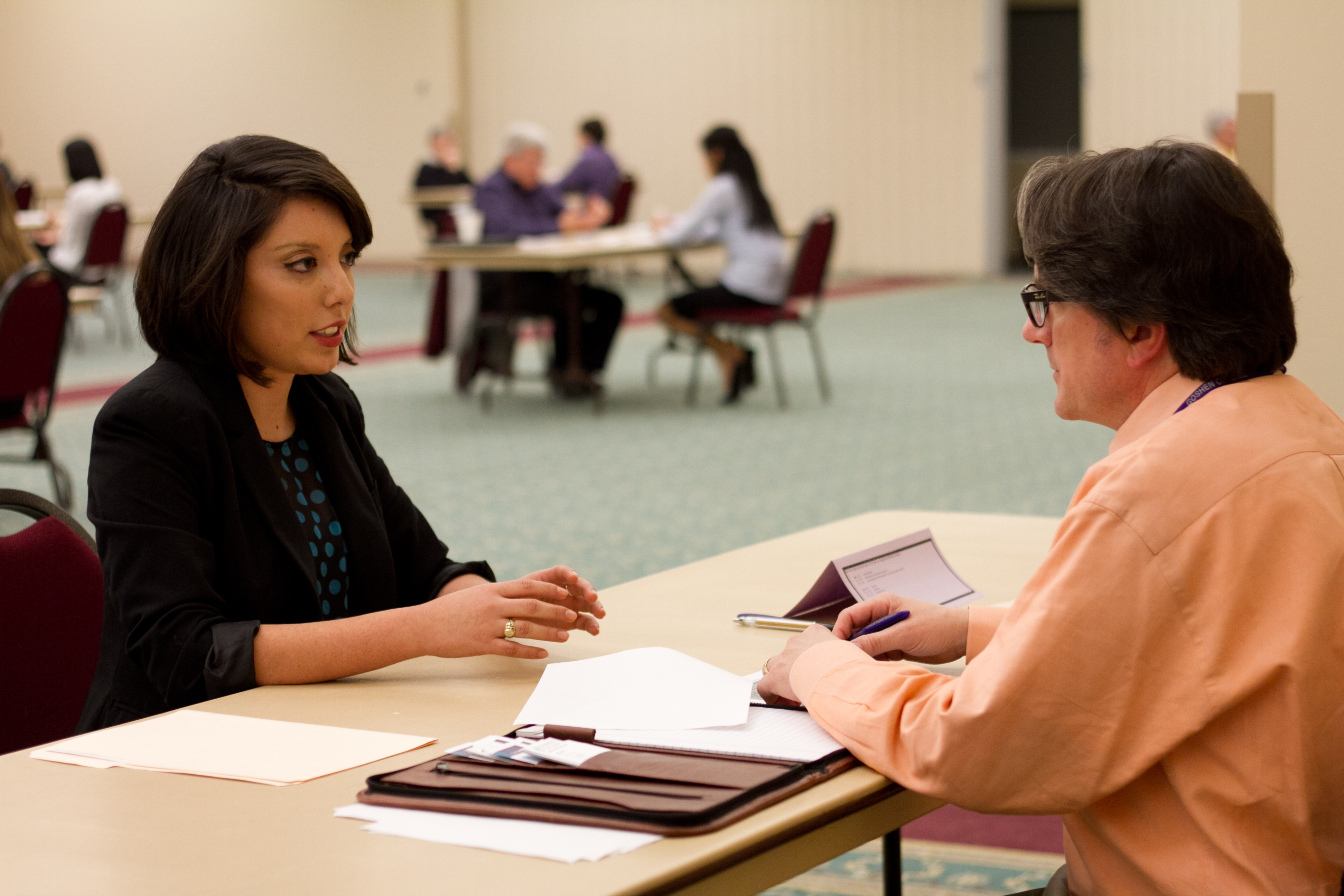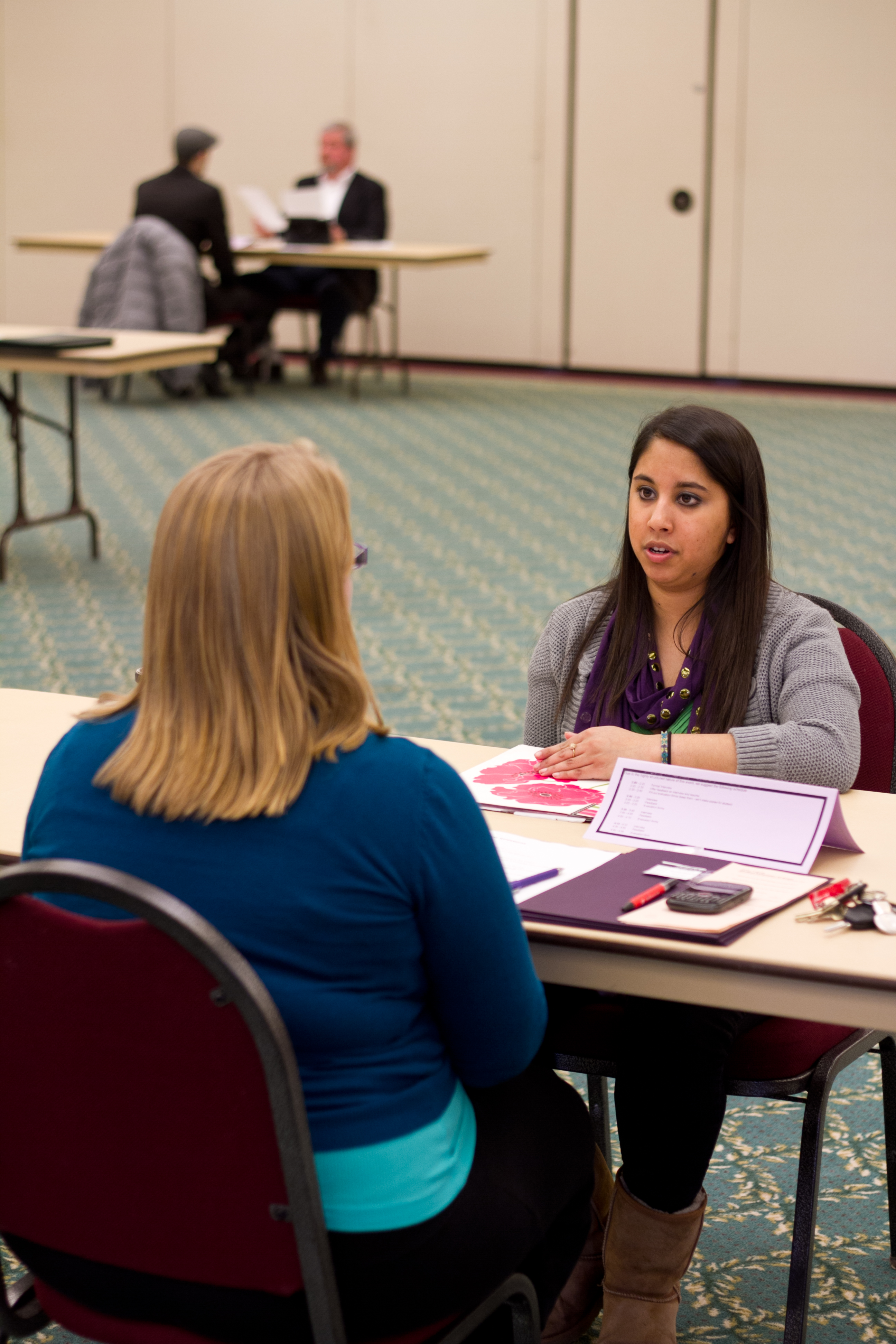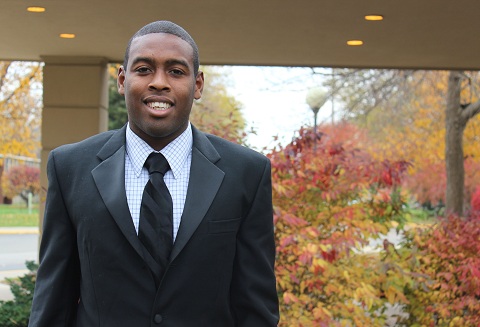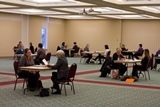
After submitting your cover letter and résumé to an organization, the next step will likely be an interview. The key to having a successful interview is preparation.
Practice answering questions, be able to articulate your skills with examples and stories, learn everything you can about the organization and the position. Check their web site and review the mission statement and history. Read current press releases and information about upcoming events. If you know people who work in the organization, give them a call and find out about the work environment and values.
Sample interview questions
Before going into an interview, think about which skills, qualifications, and examples you want to emphasize. Because employers know that the best predictor of future behavior is past behavior, many questions will focus on asking you to describe specific events. “Tell me about a time when…” or “describe a situation…” Your response needs to be specific and detailed.
It is not enough to simply read through sample questions. Be sure to rehearse your answers aloud. Practice with a friend or sign up for a practice interview with Career Services.
Questions for you to ask
During an interview the recruiter is not the only one who should be asking questions. Most recruiters will offer you the opportunity to ask them some questions, too. Use this time to demonstrate your knowledge about the organization and show the recruiter you’ve done your homework. Sample questions are listed below.
- What would a typical working day be like in this position?
- How would you describe your company culture?
- Why is this position open?
- What is your vision for this department over the next 2-3 years?
- What challenges are you currently facing as a manager?
- How long have you been with the organization?
- What has been your career path within the organization?
- What is the organization’s retention rate?
- What opportunities are available for professional development?
- What is the next step in the interviewing process?
What to wear to an interview

The final step in preparing for an interview is deciding what to wear. Whether or not you want it to be true, your personal appearance will make an impression on the recruiter. It’s important to give a positive initial impression. Even though many organizations have a relaxed dress policy for employees, interviews still follow the traditional conservative standard.
General tips:
- Wear a conservative two-piece business suit (men and women)
- Clothing should fit well (not too tight or too loose) and be clean and pressed
- Avoid bright, bold colors or flashy patterns
- Go easy on jewelry, perfume/after-shave, and make-up
- Tattoos should be covered and body piercing removed (except earrings)
- Bring a portfolio or briefcase with paper, a pen, and extra copies of your résumé
After your interview you want to be remembered for your strengths and skills, not for your clothing. Don’t wear anything that may be distracting for the interviewer. When in doubt, choose the more conservative option.
Thank you letters
Employers often say receiving a well-written and appropriate thank you letter can make or break the hiring decision. Consider these comments from Cover Letter Magic:
“Well-written thank you letters can be a powerful marketing communication tool. They have evolved into *second-tier* marketing communications – giving you the opportunity to reiterate what you bring to the organization, offer new information that was not addressed in the interview, and keep you and your qualifications in the forefront of the hiring manager’s mind. People remember other people who go the *extra mile* and put forth the extra effort. When you send a thank you note after an interview, you are communicating:
- I appreciate your time and consideration in interviewing me.
- I am interested in the opportunity. (Even if you’re not, you don’t want to burn any bridges.)
- I am well versed in business etiquette and protocol.
- I know how to deal with people and win their trust.
- I am a good communicator with excellent interpersonal skills.
- I will put forth extra effort for you and the organization.”

Send thank you notes as soon as possible, ideally within a day of your interview. Type your letters in business format for a professional appearance. Use the same paper, type style, and format that you used for your cover letter. While business letters sent by postal mail are preferred, e-mail letters are becoming increasingly common. Use your judgment as to what seems most appropriate for the organization. If you choose to write a handwritten note, keep it brief. Check to see that your thank you letter communicates the following:
- Performance
- Energy & enthusiasm
- Commitment
- Value to the organization and interest in the position
Practice Interviews
Completing a practice interview can assist you in your preparation because it forces you to verbalize answers to sample questions. Practice interviews can take a couple of forms:
-
With Director of Career Services
Call ext. 7002 to schedule an appointment.
-
With an experienced professional
Register for an interview during Super Tuesday, held once per semester. Professionals from on- and off-campus provide one-on-one practice interviews and offer valuable feedback.
-
With a friend

Ask a friend to take the role of the interviewer. (Choose a friend who can remain serious throughout the process!)
-
By yourself in front of a mirror
Practicing in front of a mirror can help you improve your posture and facial expressions. Be sure to rehearse your answers aloud, not just in your head.
Additional Interviewing & Salary Resources

Job Seeker Salary Calculator

Thorough and regularly updated salary calculator from the National Association of Colleges and Employers. Note: this link allows you to use the calculator for free
Monster.com Interview Center
Read numerous articles including sample interview questions, preparation techniques, and following up after interviews
Compare salaries across the U.S.
Glassdoor.com
Review salaries and written reviews for over 14,000 organizations. Current students (with .edu email addresses) can access the info without having to provide any salary info.
-

US Department of Labor
The Occupational Outlook Handbook allows you to search by profession and view a wealth of information including average salaries

Quint Careers

The Good Library
The library has resources providing advice for interview preparation. In the library catalog type “employment interviewing” in Browse and choose “Subject.”

Jobipedia.org
Non-profit website, a free resource connecting students with leading employers to help secure a first job. Top corporate recruiting professionals provide personal advice and timely recommendations on the challenges and realities faced by students entering the workplace.





